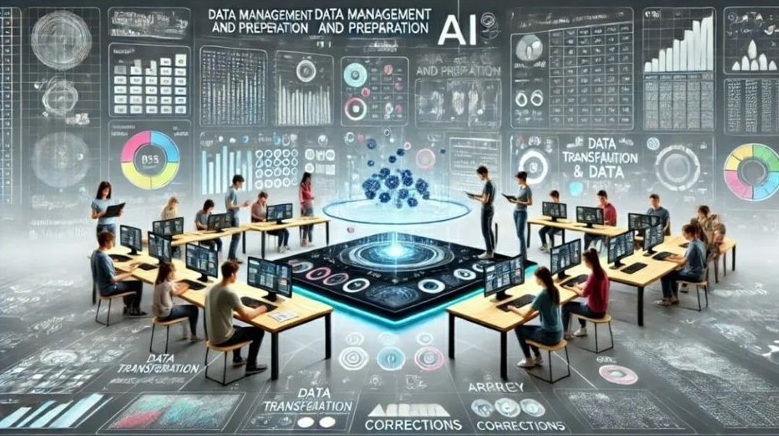

Prerequisite for this program: Introduction to Data
Completed the course Introduction to Data or have the equivalent experience prior to taking courses in this certificate.

This course addresses the organizational elements of the Data and Business Analytics (including cognitive computing and robotics process automation) functions by focusing on the management, structural/reporting, and human resource/skills considerations of data and business analytics. Topics such as determining where the group(s) should report, how they are assessed/measured, the necessary skills and how to source them, key data/analytics/cognitive computing processes, data governance, how to lead data-driven innovation in products and services, IT and non-IT roles, and customer and competitor alignment, all driven by the demand to improve the quality and speed of business decisions, minimize the risks/challenges for implementing them, and how to leverage data as a strategic asset. By concentrating on IT’s data, analytics, and cognitive computing responsibilities, in essence this course puts the candidate in the role of the CAO/CDO (Chief Analytics Officer/Chief Data Officer) as they define the vision, strategies, missions, and build the management processes and organization/skills necessary to deploy these data driven initiatives. The course focuses on the important organizational structure in terms of separate or combined organizations, and placement within the overall enterprise and IT organizational structures. This course is geared for managers and consultants engaged in building and growing this organization, including CIOs and non-IT executives to help prepare the enterprise to leverage their investment in Big Data/BA. It combines the optional Building & Managing the Analytics Organization and Building & Managing the Data Organization courses (E & F) below.
This course addresses the business digital transformation underway that are being driven/enabled by the changes in design and management of data for business intelligence/business analytics (BI/BA) and cognition systems as enterprises evolve to leveraging Big Data (and Internet of Things). It focuses on the emerging data sources (e.g., social, mobile, robotics process automation), data models, IT data management processes, and data integration considerations as they pertain to BI/BA and cognitive computing (from marketing to human resources).
The goal is to raise thought-provoking technical issues prompted by the rapid evolution of business and data technologies, as well as to provide practical information for immediate use. The course is organized around the following transformational themes:
The emphasis is on the industry considerations resulting from the integration of emerging data/knowledge, analytics, and cognitive technologies.
This course will focus on providing candidates with a well-grounded understanding and appreciation of the contemporary methods, tools and techniques used to make analytics an integral part of managerial decision making. It will concentrate on the approaches for realizing the hidden knowledge in corporate databases and will help participants make near-real time intelligent business and operation decisions. The course will introduce various types of analytics including: reporting/visualization, predictive/data mining, decision-making/prescriptive analytics, pattern recognition, and forecasting. Methodological and practical aspects of knowledge discovery algorithms will also be covered including: data preprocessing, k-nearest neighborhood algorithm, machine learning (e.g. decision trees, artificial neural networks), predictive modeling, cognitive computing, clustering and market segmentation, association rule mining techniques, and time series forecasting. The focus of this course is on understanding the potential of these analytical techniques in various organizational settings.
This course follows the Analytics Applications and Techniques Course, and will focus on the hands-on application of data mining, text mining, cognitive computing, artificial intelligence, and big data products/tools/software in solving real world business and operational problems. A variety of popular knowledge discovery software products (both professional/industrial and free/open source) will be used to demonstrate a wide range of interesting application scenarios. This course will provide participants with an in-depth understanding of the trade-offs that exist in identifying, designing and implementing knowledge discovery projects. It concentrates on building hands-on skills to apply appropriate techniques to discover hidden knowledge in corporate and external databases (both structured and unstructured) to help managers make near-real time intelligent strategic and operational business decisions. The main goal of this course is to provide candidates with not only a well-grounded understanding and appreciation of the methods and methodologies but also help candidates develop hands-on experiences in applying them to real world problems and data sets.
Candidates completing this Certificate will also be entilted to obtain a GBA Certification.
As Blockchain emerges as an essential technology across every industry (well beyond Bitcoin), with all of the buzzwords flying around it can be difficult to separate Blockchain hype from business reality. This foundational technical course will enable IT candidates to understand the essential concepts of the distributed ledger, relevant Blockchain terminology, real world Blockchain use cases, and technology management considerations for carrying out Blockchain projects.
This course will also explore the concept of anonymous consensus and how it is essential to ensuring that the blocks in a Blockchain contain the single version of the truth, as well as learning the mechanics of Blockchain validation and how consensus can eliminate errors that otherwise require reconciliation. How identities work inside of Blockchain and the dependencies that Blockchain Oracles have on Smart Contracts are covered in detail.
Specific and generic industry examples and emerging applications and blockchain technologies (e.g., Bitcoin, Ethereum, Ripple, The Hyperledger Foundation which is actually 6 Blockchain’s including Fabric from IBM, Multichain, EOS, Corda), and approaches for deploying blockchain will be the focus of this course. At the end of this course candidates will be prepared to engage in the technical management and development responsibilities necessary to effectively and efficiently implement blockchain initiatives.
Candidates should consider taking other GIIM Blockchain courses.
Artificial Intelligence (AI) is a fast-growing and evolving field, and data scientists with AI skills are in high demand. While AI having a relatively long history, it is now emerging as an essential technology across every industry. Artificial intelligence (AI) is an academic term that has been seized upon by the media, marketing departments and commentators as shorthand, and to add narrative spice. The now-dominant AI term includes physical and software robots and tools including ‘robotic process automation’, ‘cognitive automation’ and ‘artificial intelligence’.
The field requires broad training involving principles of computer science, cognitive psychology, and engineering. If you want to grow your data scientist career and capitalize on the demand for the role, these courses are for you. This foundational technical course will enable candidates to understand the essential concepts for implementing AI initiatives. Upon completion of this course candidates will be competent in Machine Learning concepts, AI Techniques, Cognitive Computing, and Deep Learning techniques using Python (the open-source software/programming library designed to conduct research and build solutions in machine learning and deep neural network structure; alternative programming languages/products will also be covered).
The focus of this course will be on assimilating the concepts of Machine Learning and Deep Learning with relevant industry specific algorithms, to build artificial neural networks and traverse layers of data abstraction, and to understand the power of data in the candidates’ new role as a Technical AI professional. The concepts of Neural Networks, Artificial Neural Networks, Natural Language Processing and working with libraries like NLTK, MatPlotlib, TFlearn, Keras &Tensorflow, along with current and emerging industry projects, will also be covered. Specific and generic industry examples and emerging applications and AI technologies, and approaches for deploying AI will be the emphasized throughout this course.
At the end of this course candidates will be prepared to engage in the technical management and development responsibilities necessary to effectively and efficiently implement AI initiatives.
Candidates should consider taking other GIIM AI courses.
Implementing the Cloud Data Center (e.g., security, systems integration)
This course provides an introduction to the concepts and principals needed to build and support an enterprise cloud data center. Candidates will investigate the emerging technologies (e.g. Business Analytics, mobile, social media/networks, security, internet of things, crowd-sourcing) and how they can be integrated, infrastructure deployments, organizational approaches and operational considerations that underlay managing the cloud data center. It will delve into how a cloud data center differs from a traditional one. In additional the course will look at methods for orchestrating public and private clouds, and how the cloud can be leveraged to delivery more cost efficient infrastructure and IT services to the enterprise.
Topics covered include: Cloud infrastructure principals as they relate to a deployment, emerging cloud technology standards, building scalable cloud networks, changing data center operations models and best practices, The Open Group Architecture Framework (TOGAF), emerging Cloud technologies, integrating technologies, managing for scale and elasticity, leveraging hybrid public and private cloud models, cloud readiness skills, develops concepts and how to apply them in support of a cloud, and finally cloud data center deployment life cycles.
The purpose of this course is to prepare candidates with the strategic, tactical, and operational competencies necessary to derive and carry out strategies, plans, and processes for migrating existing applications to the Cloud and how to build new applications that run effectively and efficiently in the Cloud.
When deriving strategies and plans for migrating to Cloud (whether insourced, outsourced, or hybrid) an area often not anticipated or understood is how to leverage this important infrastructure with the existing application portfolio and the anticipated future application portfolio. The purpose of this course is to provide the underpinnings of best practices that will enable the attendees to derive and deploy a successful Cloud applications strategy including howto build new and integrate existing applications, considerations for managing/leveraging data, how to organize activities and tasks of people and systems systematically into effective business processes, and how to evaluate cloud service offerings.
Industry Specific Courses
Candidates that have experience (1-3 years) in BI/Big Data projects are often preparing for more arduous initiatives. This courses focusing on the more complex cutting edge approaches to BI/Big Data.
The significant amount of corporate information available requires a systematic and analytical approach to selecting the most important information and anticipating major events. Statistical learning algorithms facilitate this process for understanding, modeling, and forecasting the behavior of major corporate variables. This course prepares candidates that do not have the important foundation of statistics.
This course introduces time series, and statistical and graphical models used for inference and prediction. The emphasis of the course is in the learning capability of the algorithms and their application to several business areas.
The course also provides an understanding of the basic methods underlying multivariate analysis through computer applications using regression/multivariate analysis.
Topics covered include principal components analysis, factor analysis, structural equation modeling, multidimensional scaling, correspondence analysis, cluster analysis, multivariate analysis of variance, discriminant function analysis, logistic regression, and other methods used for dimension reduction, pattern recognition, classification, and forecasting.
Participants should have a basic knowledge of probability theory, and linear algebra prior to taking this course.
In essence it takes a similar perspective as course f below, but instead of focusing on the role of the CDO (Chief Data Officer), it focuses on the role of the CAO (Chief Analytics Officer).
This course addresses what the Analytics and Cognitive Computing functions should look like by focusing on the management, organizational, and human resource considerations for leveraging analytics. It addresses the emerging job roles of data governance, data stewards, data curators, data scientist, master data architects, data security & privacy, data engineers & architects, and data scientists, as well as centers of excellence/ competency. Managing data as an asset requires significant transformation at many companies. There are cultural issues that must be dealt with, and learning how to manage transformation is a critical skill. Topics such as where the group should report, how they are assessed, the necessary skills and how to source them, key data/analytics processes, integration strategies, data governance, data-driven innovation in products and services, data security/privacy and standards, IT and non-IT roles, customer and competitor drivers, and understanding how the preceding can be used to improve the quality and speed of business decisions and processes, and the risks/challenges for implementing them to leverage data as a strategic asset are fundamental. By concentrating on ITs data and analytics responsibilities, in essence this course puts the candidate in the role of the CAO (Chief Analytics Officer) as they build the management processes and organization/skills necessary to deploy these data driven strategies.
In essence it takes a similar perspective as course e above, but instead of focusing on the role of the CAO, it focuses on the role of the CDO (Chief Data Officer).
This course addresses the role of a “Chief Data Officer” (CDO) in an enterprise. The course focuses on the management, organizational, and human resource considerations for data and analytics. It addresses how big data assets fits with other information assets of the firm, and the emerging job characteristics of data governance, data scientists, master data architects, and data security and privacy. The key is how organizations can leverage information assets to provide demonstrable business value.
Managing data as an asset frequently requires significant transformation at many enterprises including cultural and political considerations and learning how to manage the complexity of change. Topics include the alternatives for where the position should report, the necessary skills (executive and staff, IT and non-IT), governance processes, and defining an appropriate set of strategic, tactical, and operational objectives. By considering information assets from an organization-wide perspective, in essence this course puts the candidates in the role of Chief Data Officer as they build the management processes and organization/skills necessary to get the full advantage from data.
Global Institute for IT Management © 2025